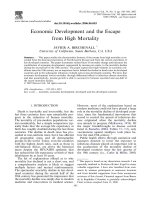The girl from alsace
Bạn đang xem bản rút gọn của tài liệu. Xem và tải ngay bản đầy đủ của tài liệu tại đây (854.85 KB, 209 trang )
The Project Gutenberg eBook, The Girl from Alsace, by Burton Egbert
Stevenson
ThiseBookisfortheuseofanyoneanywhereatnocostandwith
almostnorestrictionswhatsoever.Youmaycopyit,giveitawayor
re-useitunderthetermsoftheProjectGutenbergLicenseincluded
withthiseBookoronlineatwww.gutenberg.org
Title:TheGirlfromAlsace
A Romance of the Great War, Originally Published under the Title of Little
Comrade
Author:BurtonEgbertStevenson
ReleaseDate:April21,2011[eBook#35926]
Language:English
Charactersetencoding:ISO-8859-1
***START OF THE PROJECT GUTENBERG EBOOK THE GIRL FROM
ALSACE***
E-textpreparedbySuzanneShell,MaryMeehan,
andtheOnlineDistributedProofreadingTeam
()
frompageimagesgenerouslymadeavailableby
InternetArchive/AmericanLibraries
( />
ImagesoftheoriginalpagesareavailablethroughInternet
Note: Archive/AmericanLibraries.See
/>
THEGIRLFROMALSACE
AROMANCEOFTHEGREATWAR
OriginallyPublishedunderthetitleof
LITTLECOMRADE
BYBURTONE.STEVENSON
NEWYORK
GROSSET&DUNLAP
PUBLISHERS
COPYRIGHT,1914.
BYBURTONE.STEVENSON
COPYRIGHT,1915.
BYHENRYHOLTANDCOMPANY
PublishedMarch,1915
THEREWASSOMETHINGSINISTERANDTHREATENING
ABOUTTHOSEROOFLESSBLACKENEDWALLS.
PUBLISHER'SNOTE
TheStoryofTHEGIRLFROMALSACE
ThebookwasoriginallypublishedunderthetitleofLITTLECOMRADE.Ithasbeen
changed to THE GIRL FROMALSACE , as the publishers considered that name as
better descriptive of the character of the story. The dramatic elements of the
story led to its being put in play form, and it became the theatrical success
entitledARMSANDTHEGIRL,withFayBainterandCyrilScottplayingtheleading
rôles. It has also been produced as a photo-play by the World Film Company
under the title ON DANGEROUS GROUND, featuring Carlyle Blackwell and Gail
Kane,andisbeingwidelyshownthroughoutthecountry.
CONTENTS
CHAPTERI.THETHIRTY-FIRSTOFJULY
CHAPTERII.THEFIRSTRUMBLINGS
CHAPTERIII."STATEOFWAR"
CHAPTERIV.THEMYSTERYOFTHESATINSLIPPERS
CHAPTERV.ONEWAYTOACQUIREAWIFE
CHAPTERVI.THESNARE
CHAPTERVII.INTHETRAP
CHAPTERVIII.PRESTO!CHANGE!
CHAPTERIX.THEFRONTIER
CHAPTERX.FORTUNEFROWNS
CHAPTERXI.THENIGHTATTACK
CHAPTERXII.ANARMYINACTION
CHAPTERXIII.THEPASSAGEOFTHEMEUSE
CHAPTERXIV.THELASTDASH
CHAPTERXV.DISASTER
CHAPTERXVI.ATRUSTFULFILLED
CHAPTERXVII."LITTLECOMRADE"
ZANEGREY'SNOVELS
JACKLONDON'SNOVELS
THEGIRLFROMALSACE
CHAPTERI
THETHIRTY-FIRSTOFJULY
"Let us have coffee on the terrace," Bloem suggested, and, as his companion
nodded,liftedafingertothewaiterandgavetheorder.
Both were a little sad, for this was their last meal together. Though they had
knowneachotherlessthanafortnight,theyhadbecomefastfriends.Theyhad
been thrown together by chance at the Surgical congress at Vienna, where
Bloem,findingtheAmerican'sGermanlameandhalting,hadconstitutedhimself
asortofinterpreter,andStewarthadreciprocatedbypolishingawaysomeofthe
roughnessesandTeutonicinvolutionsofBloem'sformalEnglish.
Whenthecongressended,theyhadjourneyedbacktogetherinleisurelyfashion
through Germany, spending a day in medieval Nuremberg, another in odorous
Würzburg, and a third in mountain-shadowed Heidelberg, where Bloem had
soughtoutsomeofhisoldcomradesandinitiatedhisAmericanfriendintothe
mysteries of an evening session in the Hirschgasse. Then they had turned
northward toMayence,andsodowntheterracedRhinetoCologne.Here they
weretopart,BloemtoreturntohisworkatElberfeld,Stewartforaweekortwo
inBrusselsandParis,andthenhometoAmerica.
Bloem'strainwastoleaveinanhour,anditwastheconsciousnessofthisthat
keptthemsilentuntiltheirwaitercametotellthemthattheircoffeewasserved.
Astheyfollowedhimthroughthehall,atallmanintheuniformofacaptainof
infantry entered from the street. His eyes brightened as he caught sight of
Bloem.
"Ach,Hermann!"hecried.
Bloem,turning,stoppedaninstantforaburlesquesalute,thenthrewhimselfinto
theother'sarms.Amomentlater,hewasdragginghimforwardtointroducehim
toStewart.
"My cousin," he cried, "Ritter Bloem, a soldier as you see—a great fire-eater!
Cousin,thisismyfriend,Dr.BradfordStewart,whomIhadthegoodfortuneto
meetatVienna."
"I am pleased to know you, sir," said the captain, shaking hands and speaking
excellentEnglish.
"Youmustjoinus,"Bloeminterposed."Wearejustgoingtohavecoffeeonthe
terrace.Come,"andhecaughttheotherbythearm.
Butthecaptainshookhishead.
"No,Icannotcome,"hesaid;"reallyIcannot,muchasIshouldliketodoso.Dr.
Stewart," he added, a little hesitatingly, "I trust you will not think me
discourteousifItakemycousinasideforamoment."
"Certainlynot,"Stewartassuredhim.
"Iwilljoinyouontheterrace,"saidBloem,andStewart,noddinggood-bytothe
captain, followed the waiter, who had stood by during this exchange of
greetings,andnowledthewaytoalittletableatonecornerofthebroadbalcony
lookingoutoverthesquare.
"ShallIpourthecoffee,sir?"heasked,asStewartsatdown.
"No;Iwillwaitformycompanion,"and,asthewaiterbowedandsteppedback,
Stewartleanedforwardwithadeepbreathofadmiration.
Below him lay the green level of the Domhof, its close-clipped trees outlined
stiffly against the lights behind them. Beyond rose the choir of the great
cathedral,withitsfrettedpinnacles,andflyingbuttresses,andtoweringroof.By
day, he had found its exterior somewhat cold and bare and formal, lacking
somehow the subtle spirit of true Gothic; but nothing could be more beautiful
thanitwasnow,shimmeringinthemoonlight,bathedinluminousshadow,lacelikeandmysterious.
HewasstillabsorbedinthisfairyvisionwhenBloemrejoinedhim.Eveninthe
half-lightoftheterrace,Stewartcouldseethathewasdeeplymoved.Hisface,
usually glowing with healthy color, was almost haggard; his eyes seemed dull
andsunken.
"Nobadnews,Ihope?"Stewartasked.
Without answering him, Bloem signaled the waiter to pour the coffee, and sat
watchinghiminsilence.
"Thatwilldo,"hesaidinGerman;"wewillringifwehaveneedofyou."Then,
asthewaiterwithdrew,heglancednervouslyabouttheterrace.Itwasdeserted
saveforanoisygrouparoundatableatthefartherend."Thereisverybadnews,
myfriend,"headded,almostinawhisper."Thereisgoingtobe—war!"
Stewart stared for an instant, astonished at the gravity of his tone. Then he
noddedcomprehendingly.
"Yes,"hesaid;"Ihadnotthoughtofit;butIsupposeawarbetweenAustriaand
ServiawillaffectGermanymoreor less.OnlyIwashopingthePowerswould
interfereandstopit."
"Itseemsitcannotbestopped,"saidBloem,gloomily."Russiaismobilizingto
assistServia.AustriaisGermany'sally,andsoGermanymustcometoheraid.
UnlessRussiastopshermobilization,weshalldeclarewaragainsther.Ourarmy
hasalreadybeencalledtothecolors."
Stewartbreathedalittledeeper.
"But perhaps Russia will desist when she realizes her danger," he suggested.
"ShemustknowsheisnomatchforGermany."
"Shedoesknowit,"Bloem agreed; "butshealsoknowsthatshewillnotfight
alone.ItisnotagainstRussiawearemobilizing—itisagainstFrance."
"AgainstFrance?"echoedtheother."Butsurely——"
"Donotspeaksoloud,Ibegofyou,"Bloemcautioned."WhatIamtellingyou
isnotyetgenerallyknown—perhapsthedreadfulthingwefearwillnothappen,
afterall.ButFranceisRussia'sally—shewillbeeagerforwar—forfortyyears
shehasbeenpreparingforthismoment."
"Yes," agreed Stewart, smiling, "I have heard of 'làrevanche'; I have seen the
mourning wreaths on the Strassburg monument. I confess," he added, "that I
sympathize with France's dream of regaining her lost provinces. So do most
Americans.Weareasentimentalpeople."
"I, too, sympathize with that dream," said Bloem, quickly, "or at least I
understandit.SodomanyGermans.Wehavecometorealizethattheseizureof
Alsace and Lorraine, however justified by history, was in effect a terrible
mistake.Weshouldhavebeengenerousinourhouroftriumph—thatwaylaya
chanceoffriendshipwithapeoplewhoseprideremainedunbrokenbydisaster.
Instead,we chosetoheapinsultsuponaconquered foe,andwe havereapeda
meritedrewardofdetestation.Ironicallyenough,thoseprovinceswhichcostus
somuchhavebeentousasourceofweakness,notofstrength.Wehavehadto
fortify them, to police them, to hold them in stern repression. Even yet, they
must betreated as conqueredground.Youdonotknow—youcannotrealize—
whatthatmeans!"Hestaredoutgloomilyintothenight."Ihaveservedthere,"
headded,hoarsely.
There wassomethingin histonewhichsent ashiveracross Stewart'sscalp,as
thoughhehadfoundhimselfsuddenlyatthebrinkofahorribleabyssintowhich
hedarednotturnhiseyes.Hefanciedhecouldseeinhiscompanion'ssomber
facethestirringofghastlymemories,oftragicexperience——
"ButsinceFrancehasnotyetdeclaredwar,"hesaidatlast,"surelyyouwillwait
——"
"Ah, my friend," Bloem broke in, "we cannot afford to wait. We must strike
quickly and with all our strength. There is no secret as to Germany's plan—
Francemustbecrushedunderamightyblowbeforeshecandefendherself;after
thatitwillbeRussia'sturn."
"Andafterthat?"
"After that? After that, we shall seize more provinces and exact more huge
indemnities—and add just so much to our legacy of fear and hatred! We are
boundtoawheelfromwhichwecannotescape."
Stewartlookeddazedlyoutoverthelightedsquare.
"Ican'tunderstandit,"hesaid,atlast."Idon'tunderstandhowsuchthingscan
be.Theyaren'tpossible.They'retooterribletobetrue.Thisisacivilizedworld
—suchthingscanneverhappen—humanitywon'tendureit!"
Bloempassedatremblinghandbeforehiseyes,asamanawakingfromahorrid
dream.
"Letushopeso,atleast,"hesaid."ButIamafraid;Ishakewithfear!Europeis
topheavyundertheburdenofherawfularmaments;now,oratsomefuturetime,
shemustcometumblingdown;shemust—shemust—"hepaused,searchingfor
aword—"shemustcrumble.Perhapsthattimehascome."
"I don't believe it," Stewart protested, stoutly. "Some day she will realize the
insanefollyofthisarmament,anditwillcease."
"IwishIcouldbelieveso,"saidBloem,sadly;"butyoudonotknow,myfriend,
howwehereinGermany,forexample,areweigheddownbymilitarism.Youdo
not know the arrogance, the ignorance, the narrow-mindedness of the military
caste.TheydonothingforGermany—theyaddnothingtoherart,herscience,or
herliterature—theyaddnothingtoherwealth—theydestroyratherthanbuildup
—and yet it is they who rule Germany. We are a pacific people, we love our
homes and a quiet life; we are not a military people, and yet every man in
Germany must march to war when the word is given. We ourselves have no
voiceinthematter.Wehaveonlytoobey."
"Obeywhom?"askedStewart.
"The Emperor," answered Bloem, bitterly. "With all our progress, my friend,
withallourdevelopmentinscienceandindustry,withallourliteratureandart,
with all our philosophy, we still live in a medieval State, ruled by a king who
believeshimselfdivinelyappointed,whocandonowrong,andwho,intimeof
war at least, has absolute power over us. And the final decision as to war or
peaceiswhollyinhishands.UnderstandIdonotcomplainoftheEmperor;he
hasdonegreatthingsforGermany;hehasoftencasthisinfluenceforpeace.But
heissurroundedbyaristocratsintentonlyonmaintainingtheirprivileges,who
areterrifiedbythegrowthofdemocraticideas;whobelievethattheonlywayto
checkmate democracy is by a great war. It is they who preach the doctrine of
blood and iron; who hold that Cæsar is sacrosanct. The Emperor struggles
against them; but some day they will prove too strong for him. Besides, he
himselfbelievesinbloodandiron;hehatesdemocracyasbitterlyasanyone,for
it denies the divine right of kings!" He stopped suddenly, his finger to his ear.
"Listen!"hesaid.
Downthestreet,fromthedirectionoftheriver,camealow,continuousmurmur,
asofthewindamongtheleavesofaforest;then,asitgrewclearer,itresolved
itselfintothetramp,trampofiron-shodfeet.Bloemleanedfarforwardstaring
intothedarkness;andsuddenly,atthecorner,threemountedofficersappeared;
thenalineofsoldierswheeledintoview;thenanotherandanotherandanother,
movingasoneman.Theheadofthecolumncrossedthesquare,passedbehind
the church and disappeared, but still the tide poured on with slow and regular
undulation,dim,mysterious,andthreatening.Atlasttherearofthecolumncame
intoview,passed,disappeared;theclatterofirononstonesoftenedtoashuffle,
toamurmur,diedaway.
With a long breath, Bloem sat erect and passed his handkerchief across his
shiningforehead.
"Thereisonebattalion,"hesaid;"oneunitcomposedofathousandlesserunits
—eachunitamanwithasoullikeyoursandmine;withhopesandambitions;
with women to love him; and now marching to death, perhaps, in the ranks
yonderwithoutintheleastknowingwhy.Therearefourmillionsuchunitsinthe
armytheEmperorcancallintothefield.Iamoneofthem—Ishallmarchlike
therest!"
"You!"
"Yes—I am a private in the Elberfeld battalion." He spread out his delicate,
sensitive,surgeon'shandsandlookedatthem."Iwasatonetimeasergeant,"he
added,"butmydisciplinedidnotsatisfymylieutenantandIwasreducedtothe
ranks."
Stewart also stared at those beautiful hands, so expressive, so expert. How
vividlytheytypifiedthewasteofwar!
"But it's absurd," he protested, "that a man like you—highly-trained, highlyeducated,aspecialist—shouldbemadetoshoulderarifle.Intheranks,youare
worthnomorethanthemostignorantpeasant."
"Notsomuch,"correctedBloem."Ouridealsoldierisonewhoseobedienceis
instantandunquestioning."
"Butwhyareyounotplacedwhereyouwouldbemostefficient—inthehospital
corps,perhaps?"
"Thereareenougholdandmiddle-agedsurgeonsforthatduty.Youngmenmust
fight!Besides,Iamsuspectedofhavingtoomanyideas!"
Hesatforamomentlongerstaringdownathishands—staringtoo,perhaps,at
his career so ruthlessly shattered—then he shook himself together and glanced
acrossathiscompanionwithawrylittlesmile.
"Youwillthinkmeagreatcroaker!"hesaid."Itwasthefirstshock—thethought
of everything going to pieces. In a day or two, I shall be marching as lightheartedlyasalltheothers—knowingonlythatIamfightingtheenemiesofmy
country—andwishingtoknownomore!"
ButStewartdidnotanswerthesmile.Confusedthoughtswereflyingthroughhis
head—thoughtswhichhestruggledtocomposeintosomeorderorsequence.
Bloemlookedathimforamoment,andhissmilegrewmoreironic.
"Icanguesswhatisinyourmind,"hesaid."Youarewonderingwhywemarch
atall—whyweofferourselvesascannon-fodder,ifwedonotwishtodoso.You
arethinkingofdefiances,ofrevolutions.Buttherewillneverbearevolutionin
Germany—notinthisgeneration."
"Yes,Iwasthinkingsomethinglikethat,"Stewartagreed."Whywilltherebeno
revolution?"
"Becausewearetoothoroughlydrilledinthehabitofobedience.Thathabitis
grooveddeepintoourbrains.Wereanyofussorashastostartarevolution,the
governmentcouldstopitwithasingleword."
"Asingleword?"
"Yes—'verboten'!"retortedBloem,withashortlaugh.Thenhepushedbackhis
chair and rose abruptly. "I must say good-by. My orders are awaiting me at
Elberfeld."
Stewartrosetoo,hisfacestillmazedwithincredulity.
"Youreallymean——"
"I mean," Bloem broke in, "that to-morrow I go to my depot, hang about my
neck the metal tag stamped with my number, put on my uniform and shoulder
myrifle.Iceasetobeanindividual—Ibecomeasoldier.Good-by,myfriend,"
headded,hisvoicesoftening."Thinkofmesometimes,inthatfar-off,sublime
America of yours. One thing more—do not linger in Germany—things will be
verydifferenthereundermartiallaw.Gethomeasquicklyasyoucan;and,in
themidstofyourpeaceandhappiness,pityuspoorblindwormswhoareforced
toslayeachother!"
"ButIwillgowithyoutothestation,"Stewartprotested.
"No,no,"saidBloem;"youmustnotdothat.Iamtomeetmycousin.Good-by.
Lebewohl!"
"Good-by—and good luck!" and Stewart wrung the hand thrust into his. "You
havebeenmostkindtome."
Bloemansweredonlywithalittleshakeofthehead;thenturnedresolutelyand
hastenedfromtheterrace.
Stewart sank back into his seat more moved than he would have believed
possiblebythispartingfromamanwhom,afortnightbefore,hehadnotknown
atall.PoorBloem!Towhatfatewashebeinghurried!Aculturedmangraded
down to the level of the hind; a gentleman set to the task of slaughter; a
democratdriventofightindefenseofthedivinerightofkings!Butcouldsucha
fightsucceed?Wasanypowerstrongenoughtodragbackthehandsoftime——
And then Stewart started violently, for someone had touched him on the
shoulder.Helookeduptofindstandingoverhimatallmanindarkblueuniform
andwearingaspikedhelmet.
"Yourpardon,sir,"saidthemanincarefulEnglish;"Iamanagentofthepolice.
Imustaskyoucertainquestions."
"Verywell,"agreedStewartwithasmile."Goahead—Ihavenothingtoconceal.
Butwon'tyousitdown?"
"I thank you," and the policeman sat down heavily. "You are, I believe, an
American."
"Yes."
"Haveyouapassport?"
"Yes—I was foolish enough to get one before I left home. All my friends
laughedatmeandtoldmeIwaswastingadollar!"
"Ishouldliketoseeit."
Stewartputhishandintoaninnerpocket,drewoutthecracklingparchmentand
passeditover.Theothertookit,unfoldedit,glancedattheredsealandatthe
date, then read the very vague description of its owner, and finally drew out a
notebook.
"Peasesignyournamehere,"hesaid,andindicatedablankpage.
Stewart wrote his name, and the officer compared it with the signature at the
bottomofthepassport.Thenhenodded,foldeditup,andhandeditbackacross
thetable.
"Itisquiteregular,"hesaid."ForwhattimehaveyoubeeninGermany?"
"Abouttwoweeks.IattendedthesurgicalcongressatVienna."
"Youareasurgeonbyprofession?"
"Yes."
"Youarenowonyourwayhome?"
"Yes."
"WhenwillyouleaveGermany?"
"I am going from here to Aix-la-Chapelle in the morning, and expect to leave
thereforBrusselsto-morrowafternoonorSundaymorningatthelatest."
Theofficernotedthesedetailsinhisbook.
"AtwhathotelwillyoustayinAachen?"heasked.
"Idon'tknow.Isthereagoodonenearthestation?"
"The Kölner Hof is near the station. It is not large, but it is very good. It is
starredbyBaedeker."
"ThenIwillgothere,"saidStewart.
"Verygood,"andtheofficerwrote,"KölnerHof,Aachen,"afterStewart'sname,
closedhisnotebookandslippeditintohispocket."Youunderstand,sir,thatitis
ourdutytokeepwatchoverallstrangers,asmuchfortheirownprotectionasfor
anyotherreason."
"Yes,"assentedStewart,"Iunderstand.Ihaveheardthatthereissomedangerof
war."
"OfthatIknownothing,"saidtheothercoldly,androsequicklytohisfeet."I
bidyougood-night,sir."
"Good-night," responded Stewart, and watched the upright figure until it
disappeared.
Then, lighting a fresh cigar, he gazed out at the great cathedral, nebulous and
dream-likeinthedarkness,andtriedtopicturetohimselfwhatsuchawarwould
mean as Bloem had spoken of. With men by the million dragged into the vast
armies, who would harvest Europe's grain, who would work in her factories,
who would conduct her business? Above all, who would feed the women and
children?
And where would the money come from—the millions needed daily to keep
such armies in the field? Where could it come from, save from the sweat of
inoffensive people, who must be starved and robbed and ground into the earth
until the last penny was wrung from them? Along the line of battle, thousands
wouldmeetswiftdeath,andthousandsmorewouldstrugglebacktolifethrough
the torments of hell, to find themselves maimed and useless. But how trivial
theirsufferingsbesidetheslow,hopeless,year-longmartyrdomofthecountless
thousandswhowouldneverseeabattle,whowouldknowlittleofthewar—who
wouldknowonlythatneverthereafterwastherefoodenough,warmthenough
——
Stewart started from his reverie to find the waiter putting out the lights.
Shiveringaswithasuddenchill,hehastilysoughthisroom.
CHAPTERII
THEFIRSTRUMBLINGS
AsStewartatehisbreakfastnextmorning,hesmiledathisabsurdfearsofthe
night before. In the clear light of day, Bloem's talk of war seemed mere
foolishness. War! Nonsense! Europe would never be guilty of such folly—a
deliberateplungetoruin.
Besides,therewerenoevidencesofwar;thelifeofthecitywasmovinginits
accustomedround,sofarasStewartcouldsee;andtherewasvastreassurancein
the quiet and orderly service of the breakfast-room. No doubt the Powers had
bethoughtthemselves,hadinterfered,hadstoppedthewarbetweenAustriaand
Servia, had ceased mobilization—in a word, had saved Europe from an
explosionwhichwouldhaveshakenherfromendtoend.
But when Stewart asked for his bill, the proprietor, instead of intrusting it as
usualtotheheadwaiter,presenteditinperson.
"IfHerrStewartwouldpayingold,itwouldbeagreatfavor,"hesaid.
Like all Americans, Stewart, unaccustomed to gold and finding its weight
burdensome,carriedbanknoteswheneveritwaspossibletodoso.Emptyinghis
pockets now, he found, besides a miscellaneous lot of silver and nickel and
copper,asinglesmallgoldcoin,valuetenmarks.
"But I have plenty of paper," he said, and, producing his pocket-book, spread
fivenotesforahundredmarkseachbeforehimonthetable."What'sthematter
withit?"
"Thereisnothingatallthematterwithit,sir,"thelittlefatGermanhastenedto
assurehim;"only,justatpresent,thereisapreferenceforgold.Iwouldadvise
thatyougetgoldforthesenotes,ifpossible."
"I have a Cook's letter of credit," said Stewart. "They would give me gold.
WhereisCook'sofficehere?"
"Itisbutastepupthestreet,sir,"answeredtheothereagerly."Come,Iwillshow
you,"and,hasteningtothedoor,hepointedouttheofficeattheendofarowof
buildingsjuttingouttowardthecathedral.
Stewart,thebanknotesinhishand,hastenedthither,andfoundquiteacrowdof
peopledrawingmoneyontraveler'schecksandlettersofcredit.Henoticedthat
theywereallbeingpaidingold.They,too,itseemed,hadheardrumorsofwar,
hadbeenadvisedtogetgold;butmostofthemtreatedtherumorsasajokeand
wereheedingtheadviceonlybecausetheyneededgoldtopaytheirbills.
Eveniftherewaswar,theytoldeachother,itcouldnotaffectthem.Atmost,it
would only add a spice of excitement and adventure to the remainder of their
European tour;what they most feared was thattheywould notbepermittedto
see any of the fighting! A few of the more timid shamefacedly confessed that
they were getting ready to turn homeward, but by far the greater number
proclaimedthefactthattheyhadmadeuptheirmindsnottoaltertheirplansin
anydetail.SomuchStewartgatheredashestoodinlinewaitinghisturn;thenhe
wasinfrontofthecashier'swindow.
The cashier looked rather dubious when Stewart laid the banknotes down and
askedforgold.
"Iamcarryingoneofyourlettersofcredit,"Stewartexplained,andproducedit.
"IgotthesenotesonitatHeidelbergjusttheotherday.Nowitseemsthey'reno
good."
"They are perfectly good," the cashier assured him; "but some of the
tradespeople,whoarealwayssuspiciousandreadytotakealarm,aredemanding
gold.HowlongwillyoubeinGermany?"
"IgotoBelgiumto-nightorto-morrow."
"ThenyoucanuseFrenchgold,"saidthecashier,withvisiblerelief."Willone
hundredmarksinGermangoldcarryyouthrough?Yes?IthinkIcanarrangeit
onthatbasis;"andwhenStewartassented,countedoutfivetwenty-markpieces
andtwenty-fourtwenty-francpieces."IthinkyouarewisetoleaveGermanyas
soon as possible," he added, in a low tone, as Stewart gathered up this money
andbestoweditabouthisperson."Wedonotwishtoalarmanyone,andweare
notofferingadvice,butifwarcomes,Germanywillnotbeapleasantplacefor
strangers."
"Isitreallycoming?"Stewartasked."Isthereanynews?"
"There is nothing definite—just a feeling in the air—but I believe that it is
coming,"andheturnedtothenextinline.
Stewart hastened back to the hotel, where his landlord received with reiterated
thanks the thirty marks needed to settle the bill. When that transaction was
ended,heglancednervouslyabouttheemptyoffice,andthenleanedclose.
"You leave this morning, do you not, sir?" he asked, in a tone cautiously
lowered.
"Yes;IamgoingtoAix-la-Chapelle."
"Take my advice, sir," said the landlord earnestly, "and do not stop there. Go
straightontoBrussels."
"But why?" asked Stewart. "Everybody is advising me to get out of Germany.
Whatdangercantherebe?"
"Nodanger,perhaps,butverygreatannoyance.ItisrumoredthattheEmperor
hasalreadysignedtheproclamationdeclaringGermanyinastateofwar.Itmay
bepostedatanymoment."
"Suppose it is—what then? What difference can that make to me—or to any
American?"
"Iseeyoudonotknowwhatthosewordsmean,"saidthelittlelandlord,leaning
stillcloserandspeakingwithtwitchinglips."WhenGermanyisinastateofwar,
allcivilauthorityceases;themilitaryauthorityiseverywheresupreme.Thestate
takes charge of all railroads, and no private persons will be permitted on them
untilthetroopshavebeenmobilized,whichwilltakeatleastaweek;evenafter
that,thetrainswillrunonlywhenthemilitaryauthoritiesthinkproper,andnever
pastthefrontier.Thetelegraphsaretakenandwillsendnoprivatemessages;no
person may enter or leave the country until his identity is clearly established;
everystrangerinthecountrywillbeplacedunderarrest,ifthereisanyreasonto
suspect him. All motor vehicles are seized, all horses, all stores of food.
Businessstops,becausealmostallthemenmustgotothearmy.Imustclosemy
hotel because there will be no men left to work for me. Even if the men were
left, there would be no custom when travel ceases. Every shop will be closed
whichcannotbemanagedbywomen;everyfactorywillshut,unlessitsproduct
isneededbythearmy.Yourletterofcreditwillbeworthless,becausetherewill
benowayinwhichourbankerscangetgoldfromAmerica.No—atthattime,
Germanywillbenoplaceforstrangers."
Stewartlistenedincredulously,forallthissoundedlikethewildestextravagance.
Hecouldnotbelievethatbusinessandindustrywouldfalltopieceslikethat—it
wastoofirmlyfounded,toostronglybuilt.
"WhatIhavesaidistrue,sir,believeme,"saidthelittleman,earnestly,seeing
hisskepticalcountenance."Onethingmore—haveyouapassport?"
"Yes,"saidStewart,andtappedhispocket.
"That is good. That will save you trouble at the frontier. Ah, here is your
baggage.Good-by,sir,andasafevoyagetoyourmostfortunatecountry."
Abrawnyportershoulderedthetwosuit-caseswhichheldStewart'sbelongings,
andthelatterfollowedhimalongthehalltothedoor.Ashesteppedoutuponthe
terrace,hesawdrawnupthereabouttwentymen—somewiththeblackcoatsof
waiters, some with the white caps of cooks, some with the green aprons of
porters—whileabeardedmaninaspikedhelmetwascheckingofftheirnames
inalittlebook.AtthesoundofStewart'sfootsteps,heturnedandcastuponhim
thecold,impersonalglanceofGermanofficialdom.Thenhelookedattheporter.
"Youwillreturnasquicklyaspossible,"hesaidgrufflyinGermantothelatter,
andreturnedtohischecking.
As they crossed the Domhof and skirted the rear of the cathedral, Stewart
noticed that many of the shops were locked and shuttered, and that the street
seemed strangely deserted. Only as they neared the station did the crowd
increase. It was evident that many tourists, warned, perhaps, as Stewart had
been, had made up their minds to get out of Germany; but the train drawn up
besidetheplatformwasalongone,andtherewasroomforeverybody.Itwasa
good-humoredcrowd,ratherinclinedtolaughatitsownfearsandtoprotestthat
thisjourneywasentirelyinaccordancewithapre-arrangedschedule;butitgrew
quieterandquieterasmomentaftermomentpassedandthetraindidnotstart.
That a German train should not start precisely on time was certainly unusual;
thatitshouldwaitfortwentyminutesbeyondthattimewasstaggering.Butthe
station-master,pacingsolemnlyupanddowntheplatform,paidnoheedtothe
inquiriesaddressedtohim,andtheguardsansweredonlybyashakeofthehead
which might mean anything. Then, quite suddenly, above the noises of the
station, menacing and insistent came the low, ceaseless shuffle of approaching
feet.
Amomentlatertheheadofaninfantrycolumnappearedatthestationentrance.
Ithaltedthere,andanofficer,inalong,graycapethatfelltohisankles,strode
toward the station-master, who hastened to meet him. There was a moment's
conference,andthenthestation-master,salutingforthetenthtime,turnedtothe
expectantguards.
"Clear the train!" he shouted in stentorian German, and the guards sprang
eagerlytoobey.
The scene which followed is quite indescribable. All the Germans in the train
hastenedtogetoff,asdideverybodyelsewhounderstoodwhatwasdemanded
andknewanythingofthemethodsofmilitarism.Butmanydidnotunderstand;a
fewwhodidmadethemistakeofstandinguponwhattheyconceivedtobetheir
rights and refusing to be separated from their luggage—and all alike, men,
women, and children, were yanked from their seats and deposited upon the
platform.Someweredepositedupontheirfeet—butnotmany.Womenscreamed
as rough and seemingly hostile hands were laid upon them; men, red and
inarticulatewithanger,attemptedineffectuallytoresist.Inamomentoneandall
foundthemselvesshutoffbyalineofpolicewhichhadsuddenlyappearedfrom
nowhereanddrawnupbeforethetrain.
Then a whistle sounded and the soldiers began to file into the carriages in the
most systematic manner. Twenty-four men entered each compartment—ten
sitting down and fourteen standing up or sitting upon the others' laps. Each
coach, therefore, held one hundred and forty-four; and the battalion of seven
hundred and twenty men exactly filled five coaches—just as the General Staff
hadlongagofiguredthatitshould.
Stewart,afterwatchingthismarveloforganizationforamoment,realizedthat,if
anycarriageswereempty,itwouldbetheonesattheendofthetrain,andquietly
made his way thither. At last, in the rear coach, he came to a compartment in
whichsatoneman,evidentlyaGerman,withamelancholybeardedface.Before
thedoorstoodaguardwatchingthebattalionentrain.
"Mayonegetaboard?"Stewartinquired,inhisbestGerman.
Theguardhelduphishandforaninstant;thenthegold-braidedstation-master
shoutedasentencewhichStewartcouldnotdistinguish;buttheguarddropped
hishandandnodded.
Lookingback,theAmericansawawildmobchargingdowntheplatformtoward
him, and hastily swung himself aboard. As he dropped into his seat, he could
heartheshrieksandoathsofthemêléeoutside,andthenextmoment,apartyof
breathless and disheveled women were storming the door. They were panting,
exhausted,inarticulatewithrageandchagrin;theyfellin,rolledin,stumbledin,
untilthecompartmentwasjammed.
Stewart,sweptfromhisseatatthefirstimpact,butrallyinganddoingwhathe
couldtobringorderoutofchaos,couldnotbutadmirethemannerinwhichhis
beardedfellow-passengerclungimmovablytohisseatuntilthelastwomanwas
aboard,andthenreachedquicklyout,slammed shutthedoor,and held itshut,
despite the entreaties of the lost souls who drifted despairingly past along the
platform, seemingly blind, deaf, and totally uninterested in what was passing
aroundhim.
ThenStewartlookedatthewomen.Ninewerecrowdedintotheseats;eightwere
standing; all were red and perspiring; and most of them had plainly lost their
tempers. Stewart was perspiring himself, and he got out his handkerchief and
moppedhisforehead;thenheventuredtospeak.
"Well,"hesaid;"sothisiswar!Ihavealwayshearditwaswarmwork!"
Mostofthewomenmerelyglaredathimandwentonadjustingtheirclothing,
andfasteninguptheirhair,andstraighteningtheirhats;butone,abuxomwoman
of forty-eight or fifty, who was crowded next to him, and who had evidently
sufferedmorethanhershareofthegeneralmisfortune,turnedsharply.
"AreyouanAmerican?"shedemanded.
"Iam,madam."
"And you stand by and see your countrywomen treated in this perfectly
outrageousfashion?"
"Mydearmadam,"protestedStewart,"whatcouldoneman—evenanAmerican
—doagainstathousand?"
"Youcouldatleast——"
"Nonsense,mother,"brokeinanothervoice,andStewartturnedtoseethatitwas
aslim,palegirlofperhapstwenty-twowhospoke."Thegentlemanisquiteright.
Besides,Ithoughtitrathergoodfun."
"Goodfun!"snappedhermother."Goodfuntobejerkedaboutandtrampledon
andinsulted!Andwhereisourbaggage?Willweeverseeitagain?"
"Oh,thebaggageissafeenough,"Stewartassuredher."Thetroopswilldetrain
somewherethissidethefrontier,andwecanalltakeouroldseats."
"But why should they travel by this train? Why should they not take another
train?Whyshouldthey——"
"Areweallhere?"brokeinananxiousvoice."Isanyonemissing?"
Therewasamoment'scounting,thenageneralsighofrelief.Thenumberwas
foundcorrect.
From somewhere up the line a whistle sounded, and the state of the enginedriver'snervescouldbeinferredfromthejerkwithwhichhestarted—quitean
American jerk. All the women who were standing, screamed and clutched at
each other and swayed back and forth as if wrestling. Stewart found himself
wrestlingwiththebuxomwoman.
"Icannotstand!"shedeclared."ItisoutrageousthatIshouldhavetostand!"and
shefixedglitteringeyesuponthebeardedstranger."NoAmericanwouldremain
seatedwhileawomanofmyagewasstanding!"
But the bearded stranger gazed blandly out of the window at the passing
landscape.
There was a moment's silence, during which everyone looked at the heartless
culprit. Stewart had an uneasy feeling that, if he were to do his duty as an
American, he would grab the offender by the collar and hurl him through the
window. Then the woman next to the stranger bumped resolutely into him,
pressedhimintothecorner,anddisclosedafewinchesoftheseat.
"Sithere,Mrs.Field,"shesaid."Wecanallsqueezeupalittle."
The pressure was tremendous when Mrs. Field sat down; but the carriage was
stronglybuiltandthesidesheld.TheslendergirlcameandstoodbyStewart.
"What'sitallabout?"sheasked."Hastherebeenariotorsomething?"
"Thereisgoingtobeamostawfulriot,"answeredStewart,"unlessallsignsfail.
GermanyismobilizinghertroopstoattackFrance."









